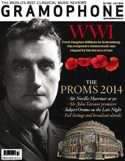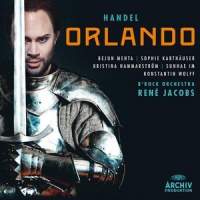Texte paru dans: / Appeared in:
*

GRAMOPHONE (07/2014)
Pour s'abonner /
Subscription information
Archiv
ARC4792199

Code-barres / Barcode : 0028947921998 (ID423)
Reviewer: Richard Wigmore
With this new recording, based on a production at La Monnaie, Orlando now rivals Giulio Cesare as the best-served Handel opera on disc. True to his reputation, Jacobs duly plays up the opera’s antic and disruptive aspects. Animated by ever-changing continuo colours (including lute, harp, organ and two vigorously proactive harpsichords), recitatives crackle with dramatic energy. Wind and thunder machines work overtime, irritatingly so in the exquisite Sinfonia in which the magician-philosopher Zoroastro restores Orlando to his senses. There are avian twitterings galore. Nor is Jacobs squeamish about tweaking Handel’s scoring, as with the unscripted recorders in the shepherdess Dorinda’s ‘Ho un certo rossore’ and Orlando’s famous mad scene. Yet while some may protest at all this interventionism, Jacobs is congenitally incapable of dullness. With three cellos and three double basses, many of the sonorities, not least in the recitatives involving Zoroastro and/or Orlando, are uncommonly weighty. The musette drones in Dorinda’s arias have a raw, demotic edge, a far cry from the etherealised rusticity evoked by William Christie in his Erato recording. Typically, Jacobs favours mobile tempi, sometimes controversially, as in the beautiful Act 1 trio where Angelica and Medoro seek to console Dorinda, or Medoro’s dulcet ‘Verdi allori’, which here becomes a jaunty minuet. Indeed, Jacobs often seems to minimise the element of nostalgic pastoral touchingly caught by Christie.
The cast, though, is more than a match for the competition. The unstable Orlando is perhaps the most dramatically challenging of Handel’s castrato roles. Combining histrionic flair, terrific agility in rapid ‘divisions’ and a wide palette of colours, Bejun Mehta rises superbly to its demands. He brings a musing inwardness to his opening cavatina and a finely judged balance of pathos, distraction and unhinged fury to the mad scene, singing the final repeat of the gavotte ‘Vaghe pupille’ as if in a trance.
Konstantin Wolff dispatches Zoroastro’s imposing arias cleanly and stylishly, though without the ideal weight and authority for the opera’s benign master-of-ceremonies. Low notes, a speciality of Antonio Montagnana who created the role in 1733, lack resonance. With her warm, evenly produced mezzo, Kristina Hammarström makes a sympathetic figure of the rather passive Medoro, almost vindicating Jacobs’s spritely tempo for ‘Verdi allori’. Sophie Karthäuser, with a hint of steel in her pellucid soprano, catches all the tenderness and passion of Angelica’s music: formidable in anger (Angelica is, after all, a queen), she phrases the elegiac ‘Verdi piante’ with sensuous grace. The endearing figure of Dorinda, unlucky in love yet distilling a naive wisdom, is portrayed with charm and spirit by Sunhae Im, much more in her element here than in some Jacobs recordings. If Christie’s recording, consistently well sung and conducted con amore, is a safer first choice, Jacobs’s boldly theatrical Orlando is a predictably vivid addition to the Handel discography.
Cliquez l'un ou l'autre
bouton pour découvrir bien d'autres critiques de CD
Click either button for many other reviews


